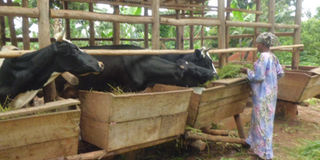Ban on unprocessed milk only serves other motives

Smallholder dairy farmers should mobilise themselves to process milk instead of selling it raw. FILE PHOTO
What you need to know:
If it was about protecting consumers, the people behind the ban would first find out why consumers go for unprocessed milk.
Government is to ban unprocessed milk from the market and, according to Dairy Development Authority (DDA), it will help protect the public from health hazards associated with adulterated milk.
That might be a reason, but certainly not the main one. The motive is to protect business interests of private milk processors.
If it was about protecting consumers, the people behind the ban would first find out why consumers go for unprocessed milk.
Most of it is adulterated; tadpoles jumping out of milk jugs is just a tip of the iceberg. Some unscrupulous traders in places like Kawempe, are using deadly chemicals to make their milk last longer.
Why it is popular
The consumers are aware of this, but continue to buy because it is what they can afford. Less than 25 per cent of the milk consumers in Uganda can afford processed milk.
Farm gate price of raw milk ranges from Shs400 to Shs600, the price of unprocessed milk in urban centres is Shs1,000 to Shs1,500, and processed milk sells at Shs2,200–Shs2,500. Now, you know why unprocessed milk dominates the market; it is cheaper.
People who buy unprocessed milk are low-income earners, who have given up milk, and only buy it for children. Divorced couples negotiating child custody, have to tackle the issue of who will buy milk for the children. Hospital and education bills come later.
Instead of the ban, DDA should explored ways to make processed milk affordable to ordinary Ugandans, and dealers in unprocessed milk will be pushed out of business.
Thanks to DDA’s efforts, the volume of milk produced in the country has increased. This is credited to farmers investing in better breeds and feeds.
Get a fair deal
Unfortunately, both farmer and consumer are yet to enjoy the fruits of this higher output. Instead farmers are complaining about low prices offered for their milk. The consumers, on the other hand, complain about the high price of processed milk. Someone somewhere in the value chain is pocketing abnormal profits.
There is need to reorganise the sector, to ensure both farmer and consumer get a fair deal.
The first step is to encourage more farmers to process milk on farm. That is how Jesa, a popular brand on the market, started.
For a long time, Jesa sold raw milk to Dairy Corporation. It was after a visit to a dairy farm in the US, that the Mulwanas “saw the light” and started processing milk at their farm. Initially, they only processed what they produce. Today, Jesa buys milk from other dairy farms. Why can’t other big dairy farmers do the same?
Processing milk at the source, which is the farm, will result in more processed milk and eventually a reduction in prices.
Yesterday and today
Previously, raw milk from different parts of the country was transported to Kampala, to be processed into various products. It made economic sense back then since Kampala had the only processing facility, the government-owned Dairy Corporation and a sizeable market to consume the products.
Today, the sector is liberalised, with several private investors coming in to process milk. But, they are concentrated around Kampala, with just collection centres in the production regions. These milk processors are the main force behind the ban.
Why do they not set up plants in the production regions and transport finished products to the market? The excuse of poor roads and insufficient power in rural areas does hold as it did 10 years ago.
Does it make sense bringing raw milk from villages to the city for processing, and then back to the village for rural consumers to buy?
They probably figured that it is cheaper push for a ban than relocate their factories closer to where the milk is produced. With the ban, consumers will have no alternative but to buy processed milk at whatever price.
Doing it locally
The reluctance by big processors to set up factories in rural areas should be treated as an opportunity for farmers to set up small processing plants on their farms.
Individually or through cooperatives, dairy farmers can make more money instead of selling it raw to those who cream off all the profits.
Ten well managed cows, each giving 20 litres daily, can sustain a rural cottage industry, creating employment and pumping more money in the local economy.
Processing milk into various products is no longer a mystery, following the introduction of different courses in food processing, by Makerere University and other tertiary institutions. In addition there are institutions like Uganda Industrial Research Institute, which are already helping farmers in different sectors, including dairy, to add value to their products.
There are also several packaging industries, which produce quality packaging material that farmers can use.
There is a huge demand for processed milk in Uganda. Encouraging more farmers to go into the business makes more sense.
Besides leaving both farmers and consumers at the mercy of a few greedy processors, the ban will cripple the sector in the long run.
The author is a farming journalist
and a consultant.
E-mail: [email protected]




